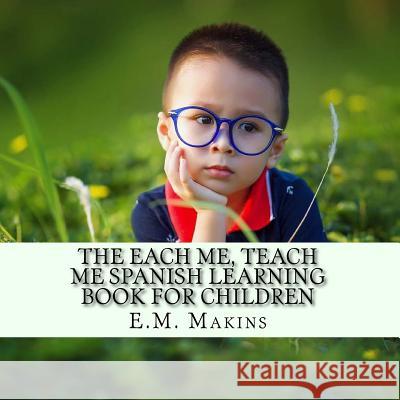The Each Me, Teach Me Spanish Learning Book For Children » książka
The Each Me, Teach Me Spanish Learning Book For Children
ISBN-13: 9781541330528 / Angielski / Miękka / 2016 / 382 str.
This incredibly, large (over 377 pages) learning book will undeniably help your young child learn words in Spanish. This book was created for young children because they learn extremely well when they taught with real life pictures that they can associate an object with, picture word recognition. The Each Me, Teach Me Spanish Learning book will teach your child a range of Spanish words, for example, animals, bugs, sea creatures, shapes, numbers, emotions, colors, small phrases, weather, and many more (words will be in Spanish and in English). With The Each Me, Teach Me Spanish Learning book, children have the opportunity to read and learn another language, which gives them more possibilities in the future, since they will be able to grasp the Spanish language easier when taken in high school and in college, which in return can enhance their careers by having bilingual skills. Below are some factual scientific studies about learning another language as a young child: -Recent scientific studies suggest that children have a deeper ability to acquire and develop language skills than adults. -There is a critical period in human development, when children are able to pick up new words and sounds in an almost effortless manner, irrespective of their primary language. -Scientists believe that before the age of 10 is the best time to start learning a language, and that as people progress to adulthood it becomes increasingly difficult to absorb words in this manner. Academic Advantages -Scientists also believe that learning a language enhances children's cognitive development. This means that children who learn Spanish are likely to develop better critical thinking skills, as well as have more flexible and creative minds. -Learning Spanish could have a positive impact on your child's performance in all subjects at school. Enhanced Learning Abilities -Studying foreign languages has been shown to have a positive effect on mental development, particularly in young people, and an enhanced overall intellectual growth. -The Association of Departments of Foreign Languages states that studying other languages at a young age can improve math and critical thinking skills as well as strengthen the use and understanding of a child's native tongue. -Research even shows that students who continuously take foreign language courses score higher on standardized tests, like the SAT and ACT, with each additional year of study. Exposure to Other Cultures -Studying a foreign language early in life exposes children to other cultures-with different values, language patterns and ways of expressing themselves-in a way they never would have experienced had they not taken up the subject. Career Opportunities -Learning a foreign language at a young age gives students an advantage in becoming successful in their chosen careers later in life. Mastering a foreign language will also increase a candidate's chances in landing a desired job because she will be able to communicate with more people from other areas of the world, and corporations view this skill as a real asset. References -American Council on the Teaching of Foreign Language: Benefits of Being Bilingual -Center for Applied Linguistics: Research -Association of Departments of Foreign Languages: Why Learn Another Language? Ethnologue: Spanish -ELDR: Why is it Easier for Young Children to Learn a New Language -American Council on the Teaching of Foreign Languages: Cognitive Benefits of Language Learning -North County Times: Demand Grows for Spanish-speaking Employees -Omniglot: Spanish -Spanish Programs: Economic Benefits of Learning Spanish -Early Advantage: Brain Boost When Toddlers Learn Spanish
Zawartość książki może nie spełniać oczekiwań – reklamacje nie obejmują treści, która mogła nie być redakcyjnie ani merytorycznie opracowana.











